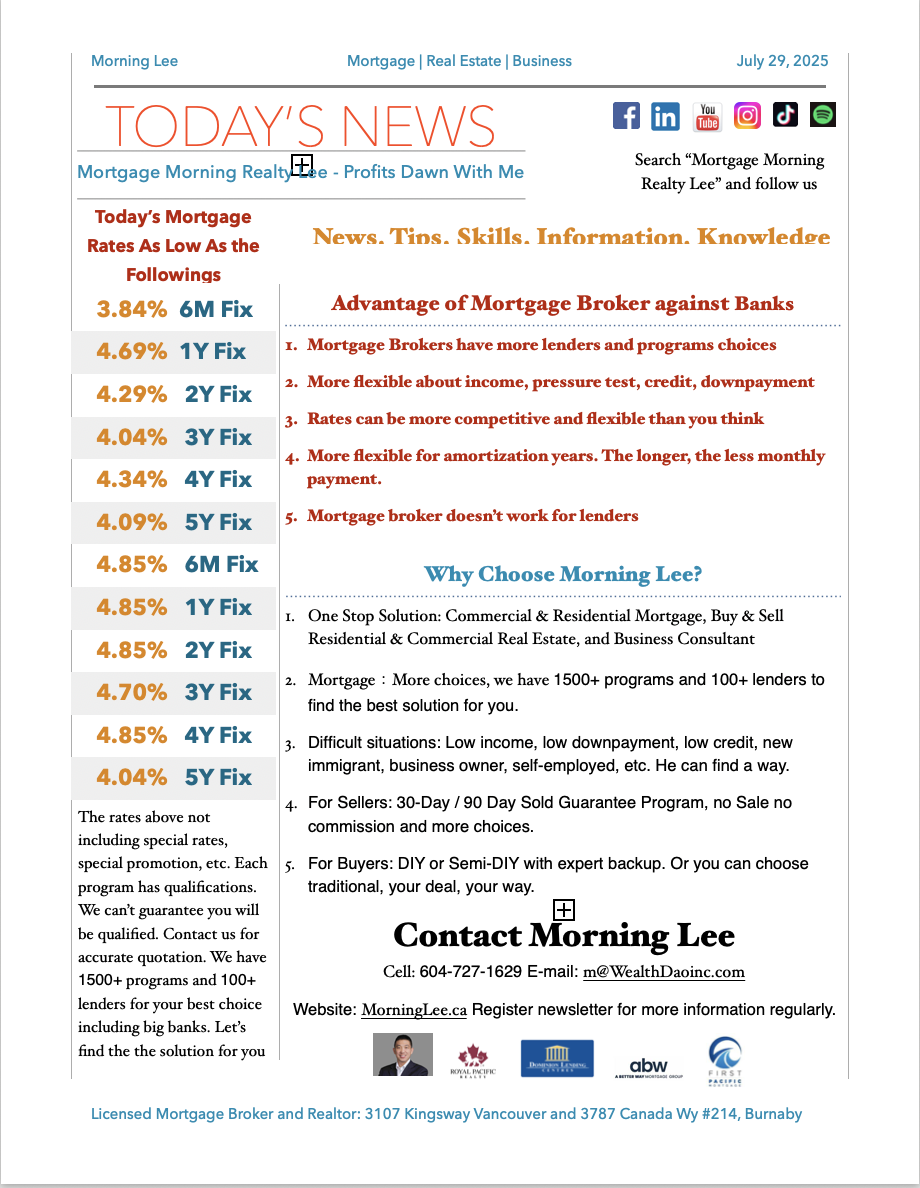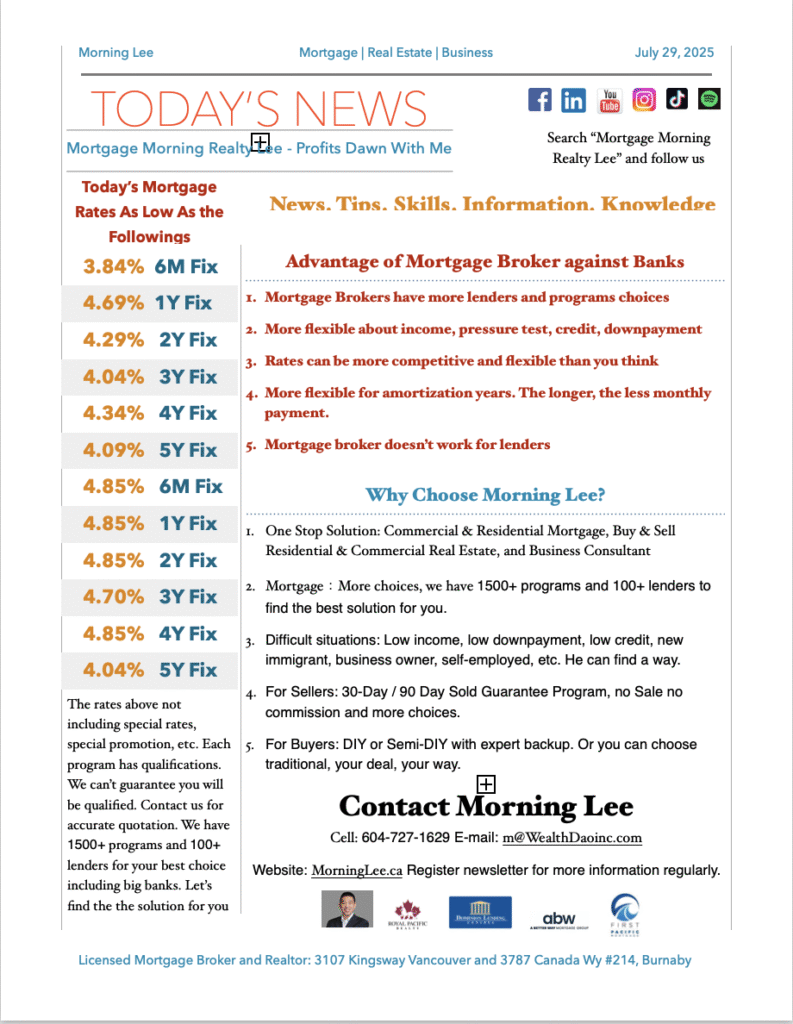Buying Property in Vancouver Residential – Vancouver Best Realtor – Morning Lee
Buying property in Vancouver is not an easy job, but I can make it easier for you. We have three different program options tailored for different people. I believe one of them will be a good fit for you.
Self Service Buyer Program
Services include the followings
- First Time Consulting
- Open House Showing
- Arranging Private Showing
- General Consulting
- Offer Strategy Consulting
- Writing an offer
- Negotiating and Accepted Offer
- Subjects Consulting and Subjects removal
- Completion Consulting
- Possession Consulting
Requirement for you
- You can arrange your own travelling to open houses and showings
- Familiar with internet
- Know local laws very well
- Know real estate market very well
- Know the community very well
- Funds are ready or will be ready
Benefit For You
- Cash Bonus, buyer rebate, To You after Closing
Semi-Self Service Program
Services include the followings
- First Time Consulting
- Open House Showing
- Arranging Private Showing
- General Consulting
- Offer Strategy Consulting
- Writing an offer
- Negotiating and Accepted Offer
- Subjects Consulting and subjects removal
- Completion Consulting
- Possession Consulting
Requirement for you
- You can arrange your own travelling to open houses and showings
- Familiar with internet
- Know local laws very well
- Know real estate market very well
- Know the community very well
- Funds are ready or will be ready
Benefit For You
- Cash Bonus, buyer rebate, To You after Closing
Full Service Buyer Program
Services include the followings
- First Time Consulting
- Open House Showing
- Arranging Private Showing
- General Consulting
- Offer Strategy Consulting
- Writing an offer
- Negotiating and accepted offer
- Subjects Consulting and subjects removal
- Completion Consulting
- Possession Consulting
Requirement For You
- Funds are ready or will be ready
Benefit For You
- Full service for purchasing your dream home
This option is a traditional classic service. But most people don’t need all the services. Which is why we offer other options.
Self-Service Buyer Program for Buying Property in Vancouver
Buying Property in Vancouver is a very simple and easy job for some experienced and skilled people – for example, real estate investors, former Realtors, or those who have experiences buying properties in Vancouver, or those who own multiple properties. For these people, we offer only essential services, saving time for you and us. This way, you will receive a large cash bonus, buyer rebate, after closing, which comes from our buyer agent commission.
However, please note that some listing agents set conditions regarding the buyer agent’s commission. For example, if the buyer agent does not attend an open house or private showing, the commission may be reduced significantly—sometimes to as low as $500.
In such cases, either you must avoid those listings, or there will be no cash bonus (buyer rebate) available to you
For more information about our Self-Service Buyer Program, please contact us directly. contact us.
Semi-Self Service Buyer Program for Buying Property in Vancouver
Some buyers don’t need full service but may not feel entirely comfortable with the self-service buyer program. For those clients, we provide essential services along with a few additional supports. This approach still saves time, which is why you can also receive a cash bonus (buyer rebate).
That said, please understand the same limitations apply: some listing agents require the buyer agent’s presence at showings or open houses. If those conditions are not met, the buyer agent’s commission may be reduced to a small amount, such as $500. In those cases, either avoid such listings, or a rebate cannot be provided.
For more information about our Semi-Self-Service Buyer Program, please contact us directly. contact us.
Full Service Buyer Program for Buying Property in Vancouver
As the name suggests, the Full-Service Buyer Program includes all services typically provided by a buyer’s agent. This is especially suitable for newcomers or anyone who may not feel confident navigating the self-service or semi-self-service programs.
With this option, we handle everything for you—making the home-buying process as smooth and stress-free as possible.
For more information about our Full Service Buyer Program, please contact us directly. contact us.
If you need mortgage, please contact us for our mortgage servcie
Another website built by WealthDao Consulting. For E-Commerce Consulting, Digital Marketing Consulting, Profit Consulting, please visit WealthDao Consulting
-

This or That: Selling Your Home Edition?
This month I’ve put together a game of This or That for you. I’m challenging you to not only pick This or That, but also to think about why it’s the better course of action. After you’ve worked through the scenario, read on for the answer and explanation. And let me know how many you got right! 
This or That: Underpricing or Overpricing Your Home?Underpricing is a common strategy in hot markets, since a lower asking price can attract multiple buyers and cause a bidding war. You could end up selling for more than the market value, just because of the demand.Overpricing deters buyers, your home sits on the market for longer, and it transfers the power to the buyer in negotiations. So, the clear winner is underpricing your home.
This or That: Selling in the Spring or Selling in the Fall?Selling in the spring means there are a lot more homes on the market at the same time, and typically an active time in the housing market. The US data shows homes sell for 1.6% more than the monthly average in the spring.Selling in the fall means less competition for sellers, and motivated buyers who want to be in a new place before the snow flies. Your real estate agent will also be less busy and can provide you more attention and better service. So, there’s no wrong answer here!
This or That: Professional Staging, Cleaning and Photography or DIY?Hiring a professional for every job takes time, coordination, and money – and gets great results. To determine if it’s the right move for you, consider how much more you’d be able to sell your home for. If the costs outweigh the benefits, it might be best to skip this step.However, don’t forget that pictures of your home are where potential buyers get their first impression of your home. Without good photos and an accessible environment for viewings, a great buyer might not be interested. This one is a toss up – consulting a neutral third party like your agent or neighbour might help you decide elements are needed and what you can do yourself. One pro tip I can offer you is to use ChatGPT (or Copilot, etc.) to help you with staging and décor – just put in the dimensions and ask for the ideal layout with your existing furniture.
This or That: Getting an Inspection Before or After Listing?If you get an inspection before you list, you’ll be able to get a full and unbiased review of your home. You can choose to fix any issues, or list as is with a clear picture of your home. You won’t be surprised or blindsided by a buyers’ inspection coming up with issues, you can list the property at the correct price, and you’ll be in the driver’s seat during negotiations.Letting the buyer have an inspection saves money but gives them the power to negotiate. The better course of action here is to inspect pre-listing.
This or That: Renovate to Increase Your Home’s Value or Leave As-is?Homeowners often complete expensive renovations before selling their home – but frequently don’t make their money back when selling. The new owners may have different tastes, or other plans for the layout or the home (including demolition!). Not only do renovations take time, but they may also require permits, inspections, or approvals. Overall, renovations before you sell are not financially beneficial.However, some repairs are critical to selling your home. Things like a leaking toilet or a hole in the drywall could easily deter a potential buyer and lower the value of your home. The best course of action here is to complete essential repairs so that the home is ready for immediate occupancy – but not spend money on extra renovations.
This or That: Using a Real Estate Agent or Listing For Sale By Owner (FSBO)?If you go the FSBO route, you take on all the stress and legal responsibility of research, showing, legal documentation and more. The main reason people choose this route is to save on the commission costs of selling a home.The benefits of using an agent are plentiful, like getting the pricing, staging and photography right. You can also rely on them for all the paperwork. If a plot twist comes up, they’re there to help. You can also benefit from having your home listed on their website and their social media accounts to get your property more visibility. The winner for the average person is to use an agent.
This or That: Requiring Notice in Advance or Showing Anytime?Keeping your home clean, tidy, and free of people and pets so that it’s ready for a showing is a real challenge for sellers if they’re living in the home they’re trying to sell. But for buyers who are already in the neighbourhood, inflexibility to view your home might discourage them from coming back. That means missed opportunities to sell and maybe even a lost sale.There isn’t a clear winner here, but being as flexible as possible with potential buyers creates the most opportunities for a sale.
This or That: Emotions and Instinct or Advice and Numbers?This might sound like an easy one – but not so fast! The highest bidder might not be the person you want to sell your home to. Imagine you received a thoughtful letter with an offer explaining how the buyer pictures raising their children in your home – vs more money from a developer who plans to raze the property.However, you need a cool head during important negotiations. A few issues are likely to be uncovered during the home inspection. No home is perfect, so don’t let a request for minor repairs derail the deal. The winner here is a balance of emotions and numbers – and each reader will need to find an equilibrium they can live with. -

Bank of Canada Holds Rates Steady As Tariff Turmoil Continues
Bank of Canada Holds Rates Steady As Tariff Turmoil Continues As expected, the Bank of Canada held its benchmark interest rate unchanged at 2.75% at today’s meeting, the third consecutive rate hold since the Bank cut overnight rates seven times in the past year. The Governing Council noted that the unpredictability of the magnitude and duration of tariffs posed downside risks to growth and lifted inflation expectations, warranting caution regarding the continuation of monetary easing.
Trade negotiations between Canada and the United States are ongoing, and US trade policy remains unpredictable.
While US tariffs are disrupting trade, Canada’s economy is showing some resilience so far. Several surveys suggest consumer and business sentiment is still low, but has improved. In the labour market, we are seeing job losses in the sectors that rely on US trade, but employment is growing in other parts of the economy. The unemployment rate has moved up modestly to 6.9%.
Inflation is close to the BoC’s 2% target, but evidence of underlying inflation pressures continues. “CPI inflation has been pulled down by the elimination of the carbon tax and is just below 2%. However, a range of indicators suggests underlying inflation has increased from around 2% in the second half of last year to roughly 2½% more recently. This largely reflects an increase in prices for goods other than energy. Shelter cost inflation remains the biggest contributor to CPI inflation, but it continues to ease. Surveys indicate businesses’ inflation expectations have fallen back after rising in the first quarter, while consumers’ expectations have not come down”.
The Bank asserted today that there are reasons to think that the recent increase in underlying inflation will gradually unwind. The Canadian dollar has appreciated, which reduces import costs. Growth in unit labour costs has moderated, and the economy is in excess supply. At the same time, tariffs impose new direct costs, which will be gradually passed through to consumers. In the current tariff scenario, upside and downside pressures roughly balance out, so inflation remains close to 2%.
The central bank provided alternative scenarios for the economic outlook. In the de-escalation scenario, lower tariffs improve growth and reduce the direct cost pressures on inflation. In the escalation scenario, higher tariffs weaken the economy and increase direct cost pressures.
So far, the global economic consequences of US trade policy have been less severe than feared. US tariffs have disrupted trade in significant economies, and this is slowing global growth, but by less than many anticipated. While growth in the US economy looks to be moderating, the labour market has remained solid. And in China, lower exports to the United States have largely been replaced with stronger exports to other countries.
In Canada, we experienced robust growth in the first quarter of 2025, primarily due to firms rushing to get ahead of tariffs. In the second quarter, the economy looks to have contracted, as exports to the United States fell sharply—both as payback for the pull-forward and because tariffs are dampening US demand.
The gap between the 2.75% overnight policy rate in Canada and the 4.25-4.50% policy rate in the US is historically wide. Another cause of uncertainty is the fiscal response to today’s economic challenges. The One Big Beautiful Bill has passed, and it will add roughly US$4 trillion to the already burgeoning US federal government’s red ink. This has caused a year-to-date rise in longer-term bond yields, steepening the yield curve.
The slowdown of the housing sector since Trump’s inauguration has been a substantial drain on the economy. The Monetary Policy Report (MPR) for July states that “growth in residential investment strengthens in the second half of 2025, partially due to an increase in resale activity after the steep decline in the first half of the year. Growth in residential investment is moderate over 2026 and 2027, supported by dissipating trade uncertainty and rising household incomes.”


Bottom Line
We expect the Canadian economy to post a small negative reading (-0.8%) in Q2 and (-0.3%) in Q3, bringing growth for the year to 1.2%. The next Governing Council decision date is September 17, which will give the Bank time to assess the underlying momentum in inflation and the dampening effect of tariffs on economic activity.
If inflation slows over the next couple of months and the economy slows in Q2 and Q3 as widely expected, the Bank will likely cut rates one more time this year, bringing the overnight rate down to 2.50%, within the neutral range for monetary policy. Bay Street economists have varying views on the rate outlook (see chart above). While the Fed will hold rates steady today, despite the incredible pressure coming from the White House, the Bank of Canada could well cut rates one more time this year.Dr. Sherry Cooper
Chief Economist, Dominion Lending Centres -

Sell Residential Property in Vancouver? Market Signs Show It’s Turning a Corner
If you’re looking to sell residential property in Vancouver, the timing may finally be shifting in your favour. After months of hesitation, the national housing market—particularly in key metros like Vancouver and Toronto—is showing signs of a turnaround. According to a July 2025 report from MorningLee.ca, both sales and price activity have begun to stabilize, hinting that we may be entering a more balanced and predictable phase of the market.
Let’s break down what this means for sellers in Vancouver, and why some property types might have a better window to sell than others.
1. Sell Residential Property inVancouver?Why This Could Be a Turning Point for Sellers
The latest data shows that home sales rose while prices held steady in June 2025. Nationally, sales were up around 3% month-over-month, and the national sales-to-new-listings ratio rose to 50.1%—a shift toward balanced market conditions.
In Vancouver, this means buyer activity is creeping back despite ongoing uncertainty like tariff threats and fluctuating interest rate expectations. As MorningLee.ca notes, market momentum may simply have been delayed by a rocky economic spring—and is now resurfacing into the summer and fall.
2. Sell Residential Property inVancouver?What It Means by Property Type: Not All Homes Are Equal
If you’re planning to sell residential property in Vancouver, it’s essential to understand how different home types are performing:
- Single-family homes: Typically more sensitive to interest rate shifts and economic headlines, these properties may attract buyers looking for long-term stability—especially as price declines have moderated.
- Townhouses and duplexes: Often appealing to move-up buyers or downsizers, these mid-density homes could benefit from stabilizing price expectations and a tighter sales-to-listings ratio.
- Condos and apartments: While not explicitly broken down in the June report, condos tend to recover later in a cycle. Sellers should monitor interest rate moves closely, as affordability is a key factor for this segment.
If you’re unsure where your property stands in the cycle, now’s a good time to assess—not just emotionally, but strategically.
3.Sell Residential Property inVancouver?Should You List Now or Wait? A Seller’s Dilemma
The report points to cautious optimism, but also underlines continued risk: the Bank of Canada held rates steady, and bond yields have risen, suggesting fixed mortgage rates may go up again. These macro factors influence how quickly deals close, or if buyers even enter the market.
So who should act now?
- Sellers of well-located, mid-priced homes in balanced neighborhoods may benefit from limited competition, as new listings fell 2.9% in June.
- Sellers who’ve been holding off since early 2024 might consider testing the market before interest rate changes swing again.
But if your property type tends to lag in recovery cycles, or if buyer traffic is light in your area, patience may still be the better strategy. Either way, strategic timing is key—and understanding where the market cycle is headed will help you plan smarter.
The Bottom Line: Watch the Data, Move with Purpose
In a shifting market, data is your best friend. From price stabilization to listing trends, the latest report from MorningLee.ca offers a detailed pulse check on what’s real, what’s emerging, and what risks are still looming. Whether you’re a homeowner considering selling, a buyer looking to enter before rates rise, or someone navigating mortgage financing in a bumpy cycle—understanding these signals can make all the difference.
And before you make any move, make sure your property has no hidden red flags. Visit https://estatedetect.com to get an in-depth risk review before you buy or sell. Peace of mind is the best market strategy.

-

Sell Residential Property in Vancouver: 5 Easily Missed Mistakes That Cost You Thousands
When homeowners plan to sell residential property in Vancouver, their focus often falls on big-picture items—pricing, staging, and timing. But the reality? Overlooking just a few small details can quietly drain your final sale price or even kill the deal entirely.
In today’s stabilizing market, where buyers are cautious and inventory is tightening, every detail counts. Below, we break down five surprisingly common missteps sellers make—especially in the Greater Vancouver area—and how to avoid them.
👉 Read: Home Sales Rose As Prices Stabilized – Housing Market is Turning a Corner
1. Planning to Sell Residential Property in Vancouver? Don’t List with a Dirty Home
First impressions matter. And in Vancouver’s competitive market, buyers walk into an open house already comparing your home to the next five on their list. A cluttered kitchen, dusty blinds, or unkempt yard doesn’t just create bad vibes—it leads to lowball offers or buyers walking away.
Professional deep cleaning before listing isn’t a luxury—it’s part of the selling strategy. It affects perceived value and, by extension, final sale price.
2.Sell Residential Property in Vancouver Smoothly by Preparing Your Property Disclosure Statement
In B.C., the Property Disclosure Statement (PDS) isn’t legally mandatory—but buyers and agents expect it. It’s a red flag when missing. Forget to disclose past water damage or unresolved plumbing issues, and your deal may fall apart during due diligence.
To sell residential property in Vancouver successfully, your paperwork needs to be clear, transparent, and ready before listing. This is especially important when mortgage lenders get involved—missing disclosures can delay financing approvals.
3. To Sell Residential Property in Vancouver at Top Dollar, Choose Professional Photography Over Phone Pics
Think your smartphone is “good enough”? Data says otherwise. Listings with professional photos attract more clicks, more showings, and often sell for higher prices.
According to REDFIN, professionally photographed homes sold for $3,400 to $11,200 more on average than those with amateur photos. In Vancouver, where a 1% pricing shift can mean tens of thousands, this isn’t a detail—it’s strategy.
4.Sell Residential Property in Vancouver with a Suite? Know BC’s New Landlord Rules to Avoid Closing Delays
Planning to sell a home with a secondary suite (basement rental, laneway house, etc.)? B.C. has recently updated its tenancy and property-use regulations. Not understanding your obligations as a seller—especially regarding notice periods or compliance with rental bylaws—can lead to legal trouble or buyer hesitation.
If you’re listing a home with tenants, make sure you’re aligned with the Residential Tenancy Act, or you risk unexpected delays.
5. Want to Sell Residential Property in Vancouver? Understand How Empty Homes and Speculation Taxes Impact Buyer Decisions
Sellers often forget that buyers factor future taxes into their offers. The Empty Homes Tax (EHT) in Vancouver and Speculation and Vacancy Tax (SVT) in B.C. can significantly impact how appealing your property is to out-of-town or investor buyers.
Properties flagged as “vacant” or subject to speculative taxes often sit longer on the market or fetch lower bids. Transparency about current tax status is crucial.
To explore whether a property has hidden risks, we recommend tools like EstateDetect.com—a smart way for buyers to investigate before they commit.
Final Thoughts
To sell residential property in Vancouver without leaving money on the table, sellers need more than just a “For Sale” sign—they need a solid understanding of paperwork, presentation, and market trends.
Need help navigating the details? Visit MorningLee.ca to work with professionals who know how to position your home—and your loan—for success.


